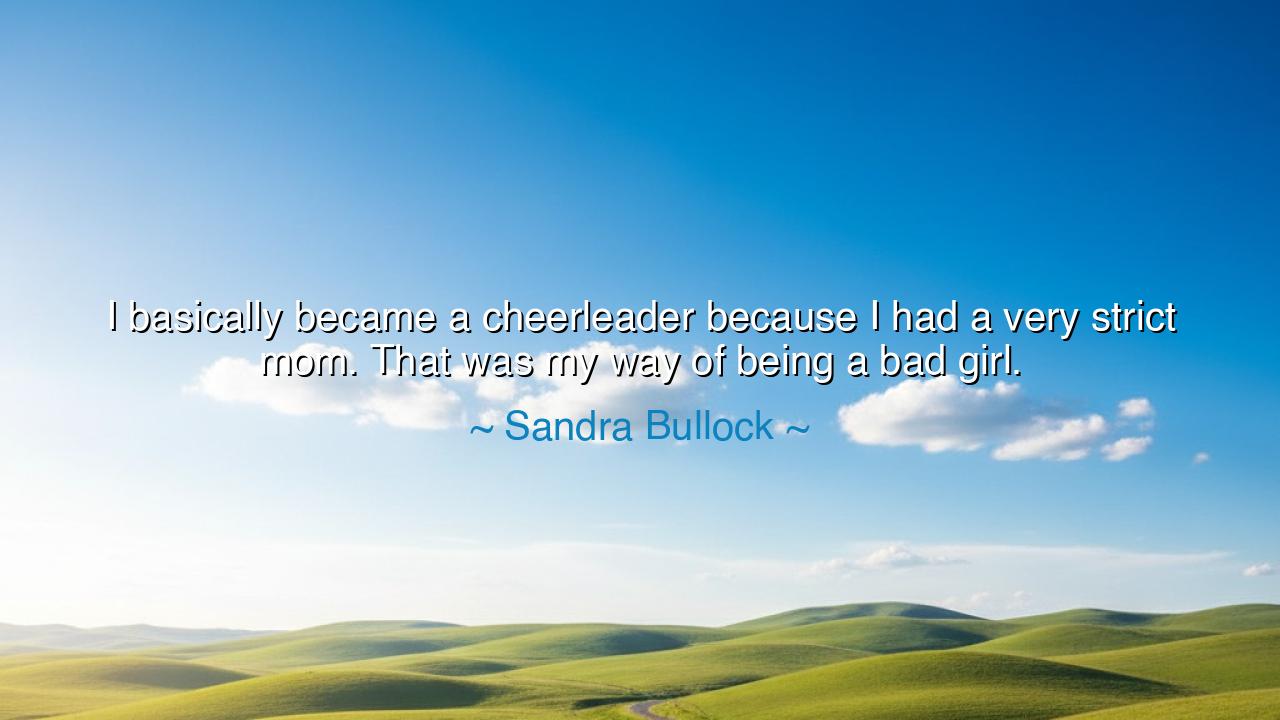
I basically became a cheerleader because I had a very strict mom.
I basically became a cheerleader because I had a very strict mom. That was my way of being a bad girl.






Hearken, O children of reflection, to the spirited words of Sandra Bullock, who said: “I basically became a cheerleader because I had a very strict mom. That was my way of being a bad girl.” Though they appear playful, these words conceal a timeless truth about the human spirit and the unending dance between freedom and discipline, obedience and rebellion. Every generation must find its way between the boundaries set by love and the yearning for individuality. Within the heart of every child lies a quiet rebellion—a desire not to defy love, but to define the self within it.
In the ancient families of every civilization, this tension between the parent and the child has been as constant as the tides. The strict mother, though guided by care, molds the soul with rules and structure, seeking to shield her child from danger. Yet the child, feeling the weight of that discipline, yearns to taste life’s freedom, to discover identity through contrast and defiance. Bullock’s act of becoming a cheerleader—a choice symbolic of joy, energy, and performance—was not rebellion against her mother’s love, but an expression of her own awakening self. In that simple act lies a universal story: the discovery of individuality within the confines of authority.
Consider the tale of the young Siddhartha, the prince who lived sheltered within palace walls. His father, fearing pain and corruption, forbade him to see the suffering of the world. Yet that very protection bred restlessness in the prince’s soul. One day, he ventured beyond the walls and witnessed the realities of life—sickness, age, death—and from that quiet rebellion emerged the enlightenment of the Buddha. Like Bullock’s jesting defiance, his act was not an act of scorn but a journey toward self-realization, born from the tension between protection and curiosity.
Thus, Bullock’s words, though light in tone, reveal a profound truth: even the gentlest rebellion may serve as a rite of passage. The child who dares to step beyond the line drawn by love is not rejecting the parent but testing the strength of their own wings. The strict mother shapes resilience; the daughter’s defiance forges identity. Together they form a sacred harmony, one that teaches both restraint and courage. The mother anchors, the child explores—and through that eternal balance, humanity learns to grow without losing its roots.
Yet there is another wisdom here, for Bullock’s “badness” was not sin, but expression. She chose a path that radiated energy, movement, and vitality. In a world that often equates rebellion with destruction, she reminds us that defiance can also be creative, joyful, and life-affirming. It is possible to resist without hatred, to assert one’s self not through violence or denial, but through the pursuit of individuality within the safety of love. Her choice of cheerleading—an art of performance and community—was rebellion transformed into creation, independence expressed through belonging.
Throughout history, such transformations have shaped art, culture, and progress. Consider the Renaissance daughters of Florence, who studied secretly in male-dominated academies; or the poet Emily Dickinson, who disobeyed convention not through argument but through verse, pouring rebellion into poetry rather than into chaos. Their defiance, like Bullock’s, arose not from hatred of authority but from an irrepressible urge to live truthfully. They remind us that rebellion, when guided by purpose, becomes growth.
The lesson, therefore, shines bright: do not fear the stirrings of rebellion within the heart of the young. Guide it, temper it, and watch it transform into creativity and strength. And to the child, the daughter, the son who bristles beneath authority—remember that the rules that bind you today may one day shape the strength of your soul. Balance discipline with discovery, and let your defiance become a form of artistry, not destruction.
And so, the teaching resounds across the generations: love must allow freedom, and freedom must honor love. The mother’s sternness and the child’s rebellion are not enemies but partners in the dance of becoming. From such dances emerge the bold spirits of the world—the creators, the thinkers, the dreamers—who, like Sandra Bullock, find their own way to be “bad,” not in wickedness, but in courage, authenticity, and joy.






AAdministratorAdministrator
Welcome, honored guests. Please leave a comment, we will respond soon